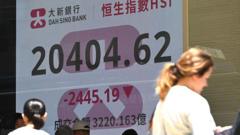**Asian stock exchanges experience their steepest declines in decades as President Trump's tariffs ripple through global markets, raising fears of an impending recession.**
**Asian Markets Plunge Amidst Tariff Turmoil**

**Asian Markets Plunge Amidst Tariff Turmoil**
**Unprecedented declines in Asian stocks signal alarming consequences of US tariffs.**
Asian financial markets faced their most significant declines in decades as President Donald Trump's recent tariff announcements sent shockwaves across the region. Stocks from Shanghai to Tokyo plummeted dramatically, marking a downturn that one market analyst described as a "bloodbath." During trading on Monday, the Shanghai Composite index fell by over 8%, while Hong Kong's Hang Seng Index tumbled more than 13%. Japan's Nikkei 225 ended the session down by 7.8%—the worst falls the region has seen in years.
European markets also mirrored this downturn, with significant slumps in the banking and defense sectors during early trading. This follows a global sell-off last week after President Trump's decision to impose tariffs ranging from 10% to 46% on various nations. Countries heavily reliant on exports to the US, such as Japan and South Korea, now face tariffs of 26%, while Vietnam braces for an alarming 46% tax, which Trump labeled as one of the "worst offenders." Other affected nations include Cambodia (49%), Thailand (36%), and China, which faces a crushing total tariff of 54%. Meanwhile, Australia, New Zealand, and Singapore have already begun implementing a 10% baseline tariff.
Qian Wang, Asia Pacific chief economist at Vanguard, expressed that "Asia is bearing the brunt of the US tariff hike" and indicated that while there might be space for negotiations, the new reality of elevated tariffs is here to stay. As fears grow that a global trade conflict could impede growth and possibly trigger a recession in the US—the world's largest economy—Asian stock declines are expected to persist as they relate to worsened export prospects.
Investors were quick to react to the changes after long weekends in various Asian markets, with the Shanghai Composite ultimately closing 7.3% lower and Taiwan’s index experiencing a 9.7% dip—the most significant in its history. In Australia, the ASX 200 slipped by 4.2%, while South Korea's Kospi index fell by 5.6%. The Hang Seng's closure at a 13.22% drop marked the largest decrease since the 2008 financial crisis.
Concerning the broader economic forecast, Goldman Sachs now predicts a 45% likelihood of a US recession occurring within the next year—up from 35% previously—while JPMorgan has escalated its projection to 60% amid the fallout from Trump's tariffs. Many Asian economies, heavily dependent on exports, could feel lasting impacts from this volatility as they adjust to worsening economic prospects.
Countries from Vietnam to Bangladesh have become significantly reliant on the US market, with major brands such as Nike and Gap producing goods in Vietnam, and Bangladesh exporting textiles valued at $8.4 billion annually to the US. The introduction of a 37% tariff on Bangladeshi goods has added fuel to already burning economic concerns.
Former US Department of Commerce Undersecretary Frank Lavin stated that “Asia is likely to feel a disproportionate brunt of this turmoil," noting that the region exports more to the US than any other market. Responding to the escalating tensions, China has implemented its own tariffs in retaliation, further deepening global market uncertainty.
As the situation develops, indication of further declines is expected. Julia Lee from FTSE Russell remarked, “US futures trading lower point to another hard session on Wall Street tonight,” suggesting turbulent trading days lie ahead. Global stock markets have suffered significant losses since Trump’s tariff announcement, erasing trillions in value from various exchanges worldwide with products from essential trade partners facing substantially increased taxes.





















